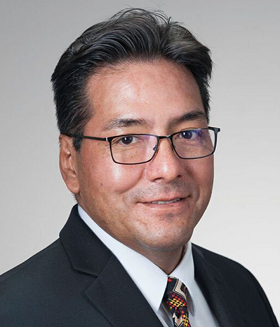The University of North Dakota (UND) and the School of Medicine & Health Sciences (SMHS) have appointed David R. Wilson, Ph.D., as the inaugural Associate Vice President for Health Research and Chair of the School’s groundbreaking Department of Indigenous Health. Dr. Wilson is set to assume these new roles starting January 1, 2024.

“It is an absolute honor to be selected to continue the outstanding work in health research ongoing at UND’s medical and health sciences college and across the university,” said Dr. Wilson, who was first introduced to the Department as a keynote speaker at the SMHS Indigenous Trauma & Resilience Research Center’s (ITRRC) first annual symposium in 2022.
A tribal citizen of the Navajo Nation with affiliations to Tódich’ii’nii (Bitter Water Clan) and Honágháahnii (One-Walks-Around Clan), Dr. Wilson joins UND from Washington D.C., where he served as a senior policy advisor with the White House Council on Native American Affairs. He previously held the position of the inaugural Director of the National Institutes of Health’s (NIH) Tribal Health Research Office.
 Make A Donation Here
Make A Donation Here
In his dual appointment within the office of UND’s Vice President for Research and Economic Development (VPRED) and the School of Medicine & Health Sciences, Dr. Wilson will provide strategic leadership for all aspects of health research across the University and specifically within the Department of Indigenous Health. As Chair, he will report directly to SMHS Dean Dr. Joshua Wynne and collaborate closely with UND’s new VPRED, Dr. Scott Snyder.
Assuming the role of Professor and Chair, Dr. Wilson will oversee the personnel, administrative, educational, and research operations of the Department of Indigenous Health. Additionally, he will actively contribute as a primary instructor, co-instructor, or guest lecturer for Indigenous Health Ph.D. and Master of Public Health (MPH) students, while also serving as a mentor and academic advisor for doctoral students.
A major ITRRC effort under Dr. Wilson’s leadership will be to solidify and expand the School’s relationship with American Indian Tribes in the region.
“I am eager to begin working side-by-side with local Tribal communities to address health related challenges through education and research,” he added. “The United States of America and Tribal communities are relying on educational institutions like the University of North Dakota to produce the next generations of researchers and healthcare providers. These researchers and providers will discover and develop innovative health interventions and treatments to improve the quality of life for all Americans.”
Dr. Wynne agreed, calling Dr. Wilson a welcome addition to the team.
“I am so pleased that we have been able to recruit Dr. Wilson to serve as chair of the Department of Indigenous Health following the departure of inaugural chair Dr. Don Warne for Johns Hopkins University about a year ago,” said Dr. Wynne. “Dr. Mel Nadeau has done a stellar job as interim chair and I know that she is looking forward to Dave’s arrival in January. And given that Scott Snyder will join UND around the same time as Dave, UND’s research enterprise will be infused with new energy and talent in the very near future.”
More Stories Like This
Feds Announce $50 Billion to States for Rural Health, Tribes Barely Mentioned in AwardsCommunity Safety Alert Issued Over Out-of-State “Treatment” Transfers
Language is Medicine: Navajo Researcher Tackles Speech Delays in Native Communities
Artificial Intelligence Impacts the Art and Science of Dentistry - Part 1
Chumash Tribe’s Project Pink Raises $10,083 for Goleta Valley Cottage Hospital Breast Imaging Center

